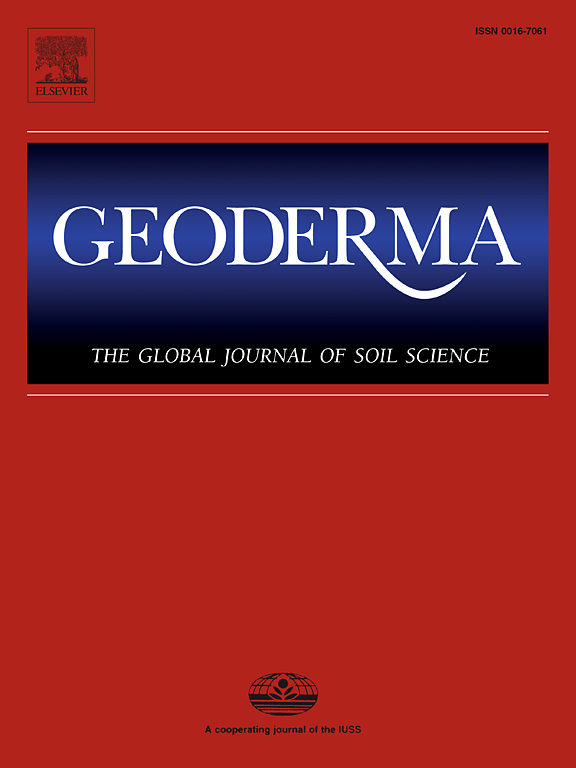Quantifying and visualizing soil macroaggregate pore structure and particulate organic matter in a Vertisol under various straw return practices using X-ray computed tomography
IF 5.6
1区 农林科学
Q1 SOIL SCIENCE
引用次数: 0
Abstract
The structure of soil pores plays a crucial role in determining the distribution and retention of particulate organic matter (POM) within soil aggregates, yet the specific effects of different straw return practices on POM stabilization through soil pore structure remain poorly understood. This study aimed to quantify and visualize soil macroaggregates POM distribution and pore structure using advanced X-ray computed tomography (CT) and image processing techniques under three straw return practices: no-tillage with straw mulching (NTS), traditional rotary tillage with straw incorporation (RTS), and deep plowing with straw incorporation (DPS) in a Vertisol. A total of 27 soil aggregates (4–6 mm) from soil depths of 0–10, 10–20, and 20–40 cm were analyzed at an 8-μm resolution. The results showed that NTS significantly increased POM content and surface area density in the 0–10 cm soil layer compared to RTS. In contrast, DPS was most effective in deeper soil layers (20–40 cm), maintaining high POM content and promoting the development of extensive and well-connected pore networks, as evidenced by significantly higher connected porosity and mean breadth density of POM. Additionally, strong positive correlations were observed between POM content, connected porosity, and pore connectivity (P < 0.05). These findings highlight the importance of selecting appropriate straw return practices to optimize POM retention and enhance soil C storage, particularly in the context of sustainable soil management in Vertisols.
利用 X 射线计算机断层扫描技术量化和可视化不同秸秆还田措施下的荒漠土壤中的大颗粒孔隙结构和颗粒有机质
土壤孔隙结构在决定颗粒有机质(POM)在土壤团聚体中的分布和保留方面起着至关重要的作用,但人们对不同秸秆还田方法通过土壤孔隙结构稳定颗粒有机质的具体影响仍然知之甚少。本研究旨在利用先进的 X 射线计算机断层扫描(CT)和图像处理技术,量化和直观地显示在三种秸秆还田方式(秸秆覆盖免耕(NTS)、秸秆掺入传统旋耕(RTS)和秸秆掺入深耕(DPS))下,惰性土壤中土壤大团聚体 POM 的分布和孔隙结构。共分析了 0-10 厘米、10-20 厘米和 20-40 厘米土壤深度的 27 个土壤团聚体(4-6 毫米),分辨率为 8 微米。结果表明,与 RTS 相比,NTS 能明显提高 0-10 厘米土层中的 POM 含量和表面积密度。相比之下,DPS 在较深的土层(20-40 厘米)中最为有效,它能保持较高的 POM 含量,并促进广泛且连接良好的孔隙网络的发展,POM 的连接孔隙度和平均广度密度明显提高就是证明。此外,还观察到 POM 含量、连通孔隙度和孔隙连通性之间存在很强的正相关性(P < 0.05)。这些发现凸显了选择适当的秸秆还田方法以优化 POM 保留和提高土壤 C 储存的重要性,尤其是在椎体土壤可持续管理的背景下。
本文章由计算机程序翻译,如有差异,请以英文原文为准。
求助全文
约1分钟内获得全文
求助全文
来源期刊

Geoderma
农林科学-土壤科学
CiteScore
11.80
自引率
6.60%
发文量
597
审稿时长
58 days
期刊介绍:
Geoderma - the global journal of soil science - welcomes authors, readers and soil research from all parts of the world, encourages worldwide soil studies, and embraces all aspects of soil science and its associated pedagogy. The journal particularly welcomes interdisciplinary work focusing on dynamic soil processes and functions across space and time.
 求助内容:
求助内容: 应助结果提醒方式:
应助结果提醒方式:


